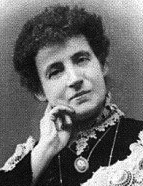

The high school Maths teacher Gustav Michaëlis took an interest in German Studies and specialist tachygraphic (Stolze System), orthographic and phonetic systems. It was in this context that he joined the teaching staff of the University of Berlin in 1851 – the year in which his daughter, Karoline Wilhelma, was born (D. Carolina de Vasconcelos..., 1958, p.10). His wife, Henriette Louise Lobeck, soon left the education of their four children to their father, although it is not known whether this was because she died or the couple divorced. It was with Gustav that the girls Henriette and Karoline had their first contacts with the Romance languages (Spanish, French, Portuguese). The elder of the two was to follow in her father’s lexicographic footsteps, putting together various tomes of Dicionário Michaëlis for the Brokhaus publishing house. The younger, Karoline, became a self-taught philologist. From the ages of seven to sixteen, she attended the Luisenschule – an eminent Berlin girls’ school whose headmaster was the philologist Eduard Maetzner. There she made at least two lifelong friends: her schoolmate Helene Lange, with whom she was to work on texts designed to publicise and intervene in the feminist cause; and, from the age of fourteen onwards, Carl Goldbeck, a teacher who was to guide her in her studies and later to become the father of Eduard Goldbeck, who lived in Porto and was a regular visitor to her home there.
She grew up in a world of frequent contacts with leading figures like the storyteller Jakob Grimm, the geographer and naturalist Alexander von Humboldt and the writer Varnhagen von Ense. From 1867 onwards, she learnt Romance languages and studied the respective literatures of her own accord, plunged adventurously into Sanskrit and the Slavic and Semitic languages and literatures, and showed a growing interest in the peninsular languages, particularly Portuguese, Spanish and Catalan. She applied to take Arabic Studies at the University of Berlin as a visiting student, but her request was denied and Wetzstein started to teach her privately, perhaps thanks to his personal and academic relationship with Gustav Michaëlis (Carolina Michaëlis de Vasconcelos, 1985; Escritoras de Portugal, vol. II, 1924, p.395).
At the age of sixteen, Brokhaus in Leipzig hired Karoline as a Spanish and Portuguese reviser. She prepared a school edition of Herder’s Der Cid, with a critical study by Julian Schmidt, which went to press in 1868.
